Google's Management and Operations: Leader, Manager Roles and Theories
VerifiedAdded on 2020/10/22
|9
|3690
|416
Report
AI Summary
This report provides a comprehensive analysis of leadership and management within Google's operational context. It begins by defining and comparing the distinct roles and characteristics of leaders and managers, highlighting their similarities and differences, and emphasizing their importance in achieving organizational objectives. The report then delves into the application of various leadership theories, including contingency, systems, and situational leadership, evaluating their strengths and weaknesses. Through the examination of specific situational examples, the report illustrates how these leadership approaches are implemented within Google to manage and respond to different business environments. The report explores hard and soft skills required for managers and leaders. The analysis underscores the significance of adapting leadership styles to specific circumstances and the need for leaders and managers to possess a diverse skill set to effectively navigate the complexities of the business environment. The report includes an introduction, activity 1 and 2, conclusion and references.
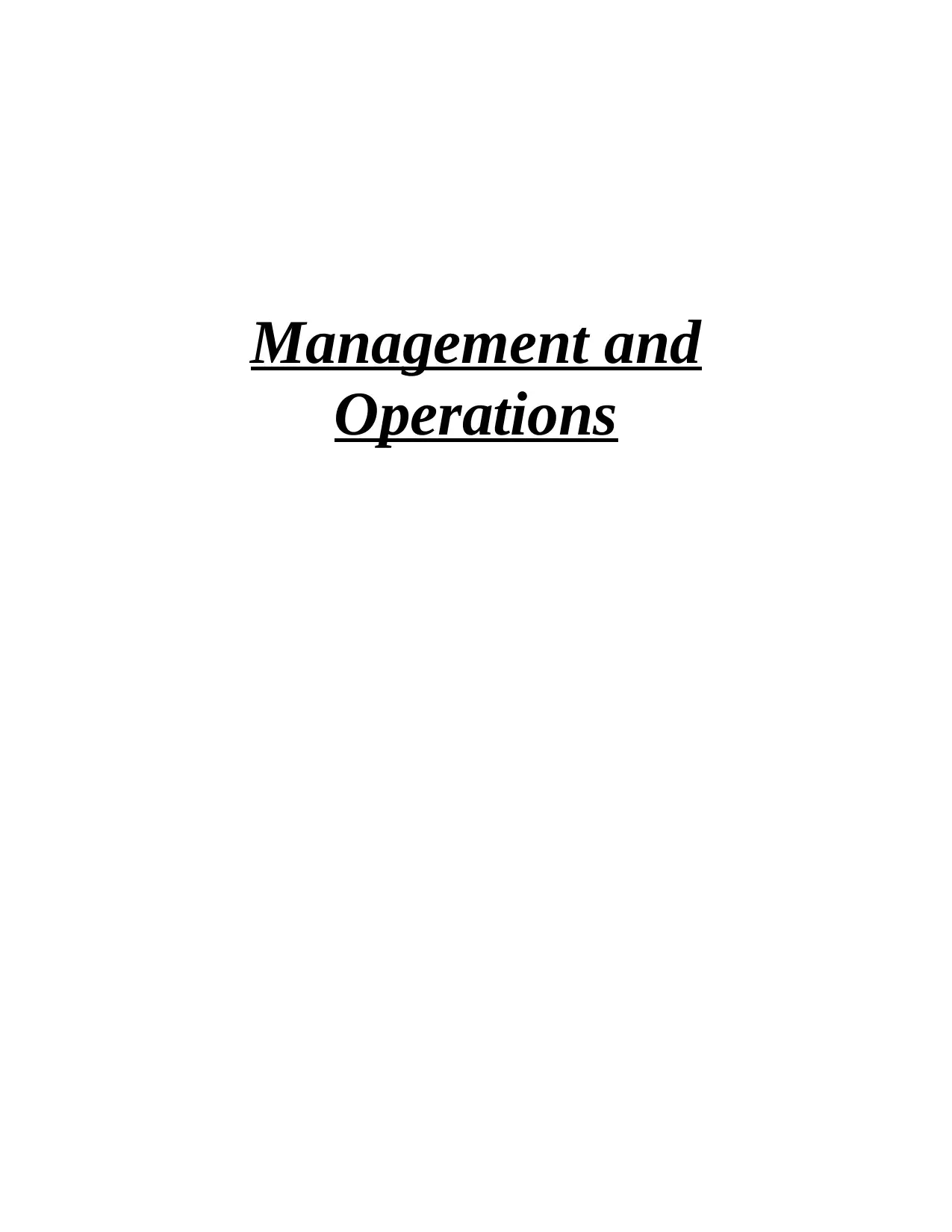
Management and
Operations
Operations
Paraphrase This Document
Need a fresh take? Get an instant paraphrase of this document with our AI Paraphraser
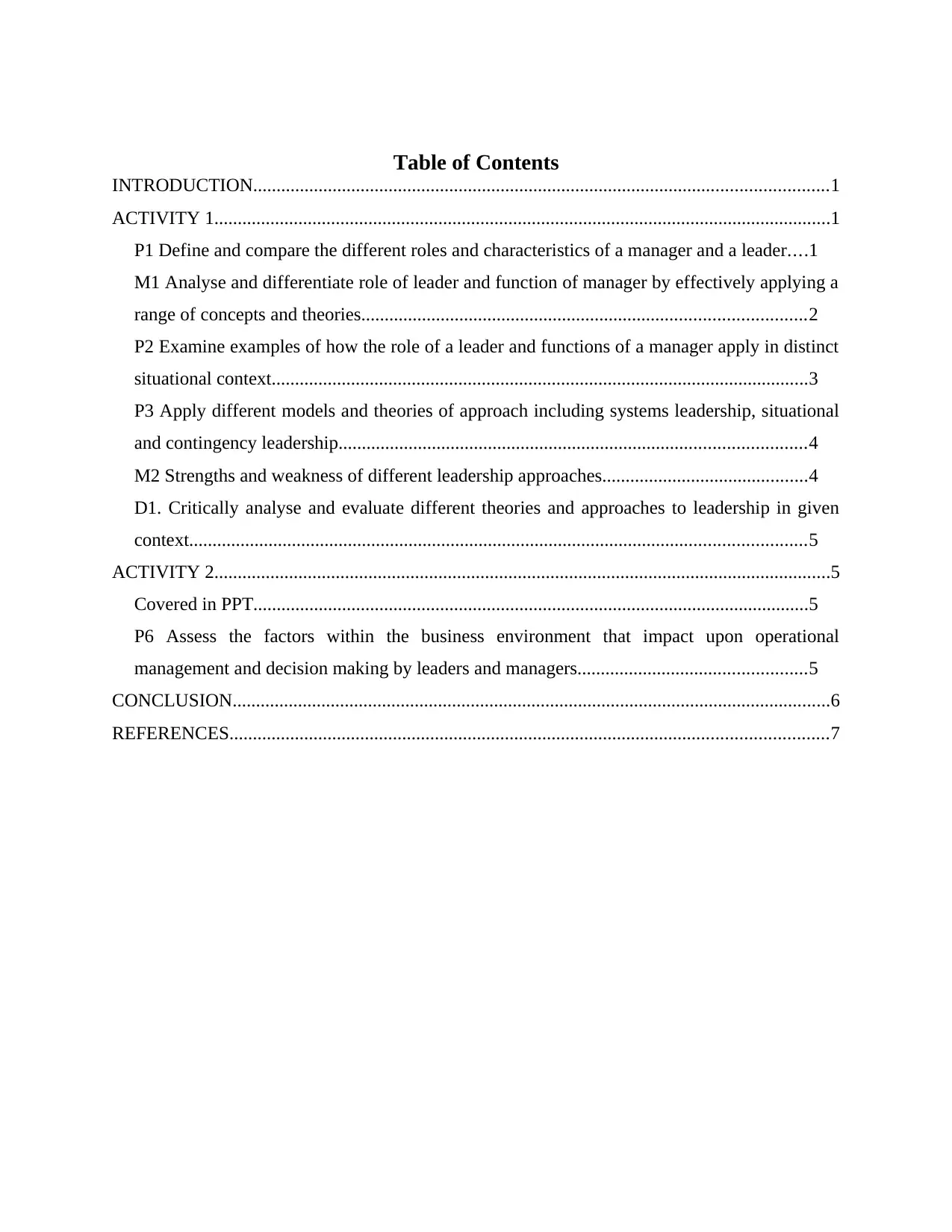
Table of Contents
INTRODUCTION...........................................................................................................................1
ACTIVITY 1....................................................................................................................................1
P1 Define and compare the different roles and characteristics of a manager and a leader....1
M1 Analyse and differentiate role of leader and function of manager by effectively applying a
range of concepts and theories...............................................................................................2
P2 Examine examples of how the role of a leader and functions of a manager apply in distinct
situational context...................................................................................................................3
P3 Apply different models and theories of approach including systems leadership, situational
and contingency leadership....................................................................................................4
M2 Strengths and weakness of different leadership approaches............................................4
D1. Critically analyse and evaluate different theories and approaches to leadership in given
context....................................................................................................................................5
ACTIVITY 2....................................................................................................................................5
Covered in PPT.......................................................................................................................5
P6 Assess the factors within the business environment that impact upon operational
management and decision making by leaders and managers.................................................5
CONCLUSION................................................................................................................................6
REFERENCES................................................................................................................................7
INTRODUCTION...........................................................................................................................1
ACTIVITY 1....................................................................................................................................1
P1 Define and compare the different roles and characteristics of a manager and a leader....1
M1 Analyse and differentiate role of leader and function of manager by effectively applying a
range of concepts and theories...............................................................................................2
P2 Examine examples of how the role of a leader and functions of a manager apply in distinct
situational context...................................................................................................................3
P3 Apply different models and theories of approach including systems leadership, situational
and contingency leadership....................................................................................................4
M2 Strengths and weakness of different leadership approaches............................................4
D1. Critically analyse and evaluate different theories and approaches to leadership in given
context....................................................................................................................................5
ACTIVITY 2....................................................................................................................................5
Covered in PPT.......................................................................................................................5
P6 Assess the factors within the business environment that impact upon operational
management and decision making by leaders and managers.................................................5
CONCLUSION................................................................................................................................6
REFERENCES................................................................................................................................7
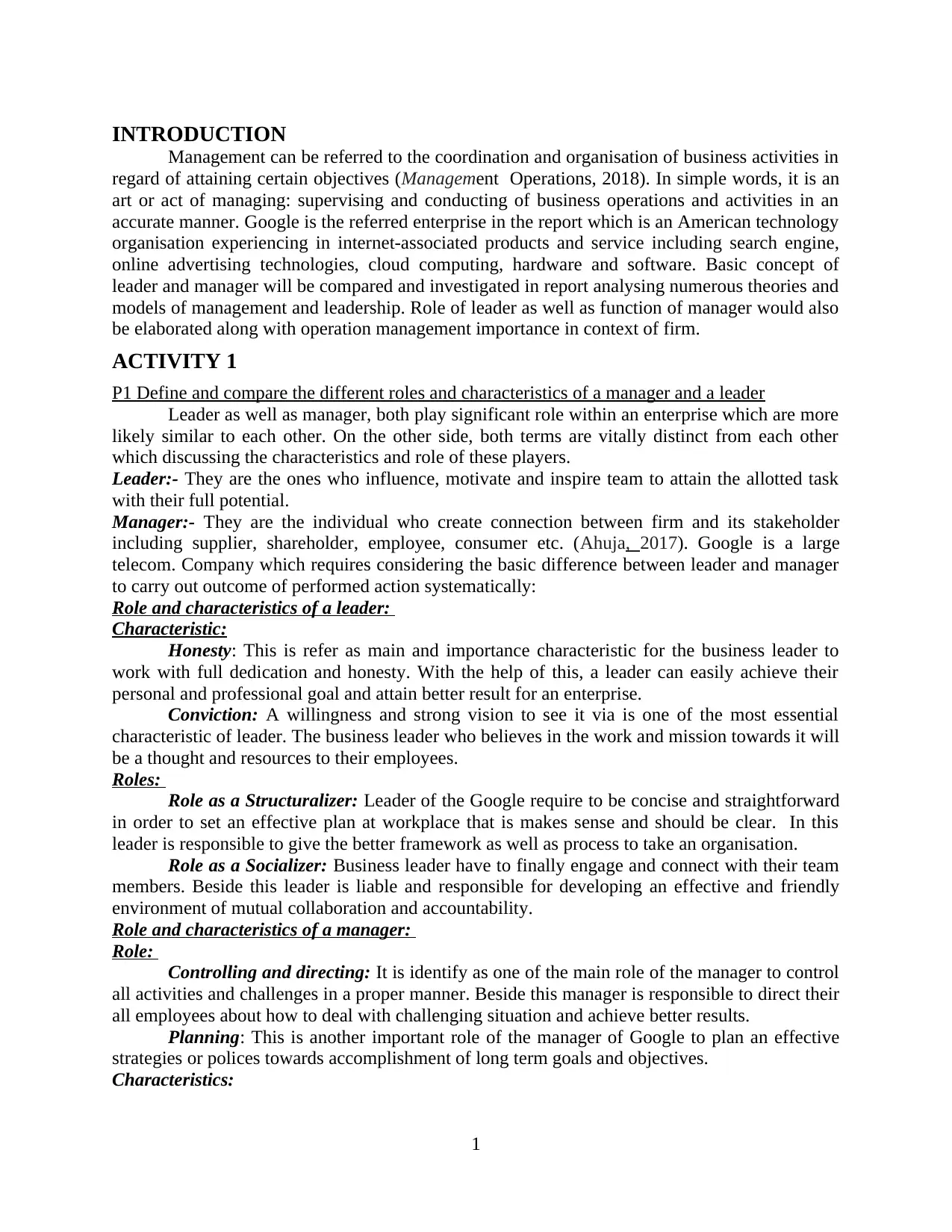
INTRODUCTION
Management can be referred to the coordination and organisation of business activities in
regard of attaining certain objectives (Management Operations, 2018). In simple words, it is an
art or act of managing: supervising and conducting of business operations and activities in an
accurate manner. Google is the referred enterprise in the report which is an American technology
organisation experiencing in internet-associated products and service including search engine,
online advertising technologies, cloud computing, hardware and software. Basic concept of
leader and manager will be compared and investigated in report analysing numerous theories and
models of management and leadership. Role of leader as well as function of manager would also
be elaborated along with operation management importance in context of firm.
ACTIVITY 1
P1 Define and compare the different roles and characteristics of a manager and a leader
Leader as well as manager, both play significant role within an enterprise which are more
likely similar to each other. On the other side, both terms are vitally distinct from each other
which discussing the characteristics and role of these players.
Leader:- They are the ones who influence, motivate and inspire team to attain the allotted task
with their full potential.
Manager:- They are the individual who create connection between firm and its stakeholder
including supplier, shareholder, employee, consumer etc. (Ahuja, 2017). Google is a large
telecom. Company which requires considering the basic difference between leader and manager
to carry out outcome of performed action systematically:
Role and characteristics of a leader:
Characteristic:
Honesty: This is refer as main and importance characteristic for the business leader to
work with full dedication and honesty. With the help of this, a leader can easily achieve their
personal and professional goal and attain better result for an enterprise.
Conviction: A willingness and strong vision to see it via is one of the most essential
characteristic of leader. The business leader who believes in the work and mission towards it will
be a thought and resources to their employees.
Roles:
Role as a Structuralizer: Leader of the Google require to be concise and straightforward
in order to set an effective plan at workplace that is makes sense and should be clear. In this
leader is responsible to give the better framework as well as process to take an organisation.
Role as a Socializer: Business leader have to finally engage and connect with their team
members. Beside this leader is liable and responsible for developing an effective and friendly
environment of mutual collaboration and accountability.
Role and characteristics of a manager:
Role:
Controlling and directing: It is identify as one of the main role of the manager to control
all activities and challenges in a proper manner. Beside this manager is responsible to direct their
all employees about how to deal with challenging situation and achieve better results.
Planning: This is another important role of the manager of Google to plan an effective
strategies or polices towards accomplishment of long term goals and objectives.
Characteristics:
1
Management can be referred to the coordination and organisation of business activities in
regard of attaining certain objectives (Management Operations, 2018). In simple words, it is an
art or act of managing: supervising and conducting of business operations and activities in an
accurate manner. Google is the referred enterprise in the report which is an American technology
organisation experiencing in internet-associated products and service including search engine,
online advertising technologies, cloud computing, hardware and software. Basic concept of
leader and manager will be compared and investigated in report analysing numerous theories and
models of management and leadership. Role of leader as well as function of manager would also
be elaborated along with operation management importance in context of firm.
ACTIVITY 1
P1 Define and compare the different roles and characteristics of a manager and a leader
Leader as well as manager, both play significant role within an enterprise which are more
likely similar to each other. On the other side, both terms are vitally distinct from each other
which discussing the characteristics and role of these players.
Leader:- They are the ones who influence, motivate and inspire team to attain the allotted task
with their full potential.
Manager:- They are the individual who create connection between firm and its stakeholder
including supplier, shareholder, employee, consumer etc. (Ahuja, 2017). Google is a large
telecom. Company which requires considering the basic difference between leader and manager
to carry out outcome of performed action systematically:
Role and characteristics of a leader:
Characteristic:
Honesty: This is refer as main and importance characteristic for the business leader to
work with full dedication and honesty. With the help of this, a leader can easily achieve their
personal and professional goal and attain better result for an enterprise.
Conviction: A willingness and strong vision to see it via is one of the most essential
characteristic of leader. The business leader who believes in the work and mission towards it will
be a thought and resources to their employees.
Roles:
Role as a Structuralizer: Leader of the Google require to be concise and straightforward
in order to set an effective plan at workplace that is makes sense and should be clear. In this
leader is responsible to give the better framework as well as process to take an organisation.
Role as a Socializer: Business leader have to finally engage and connect with their team
members. Beside this leader is liable and responsible for developing an effective and friendly
environment of mutual collaboration and accountability.
Role and characteristics of a manager:
Role:
Controlling and directing: It is identify as one of the main role of the manager to control
all activities and challenges in a proper manner. Beside this manager is responsible to direct their
all employees about how to deal with challenging situation and achieve better results.
Planning: This is another important role of the manager of Google to plan an effective
strategies or polices towards accomplishment of long term goals and objectives.
Characteristics:
1
⊘ This is a preview!⊘
Do you want full access?
Subscribe today to unlock all pages.

Trusted by 1+ million students worldwide
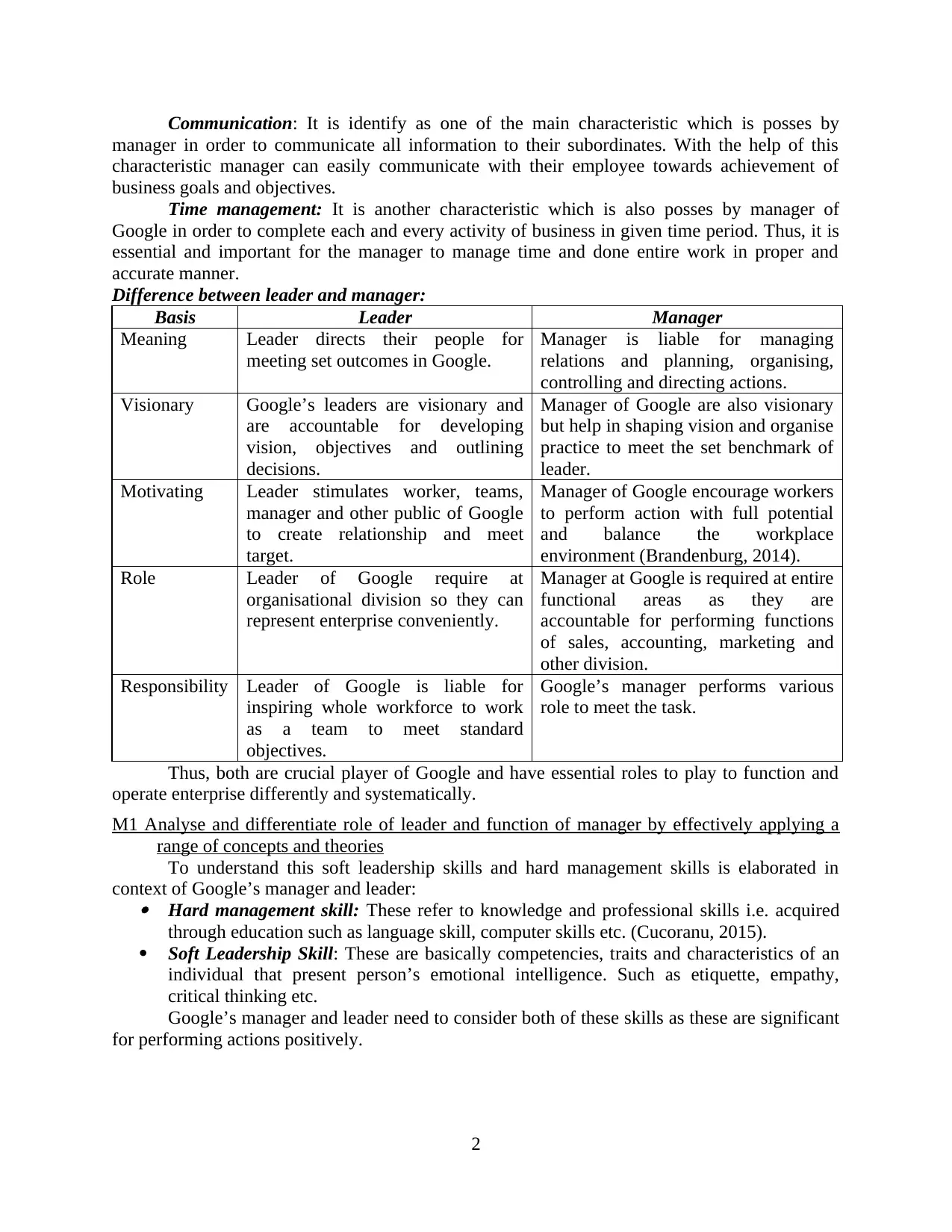
Communication: It is identify as one of the main characteristic which is posses by
manager in order to communicate all information to their subordinates. With the help of this
characteristic manager can easily communicate with their employee towards achievement of
business goals and objectives.
Time management: It is another characteristic which is also posses by manager of
Google in order to complete each and every activity of business in given time period. Thus, it is
essential and important for the manager to manage time and done entire work in proper and
accurate manner.
Difference between leader and manager:
Basis Leader Manager
Meaning Leader directs their people for
meeting set outcomes in Google.
Manager is liable for managing
relations and planning, organising,
controlling and directing actions.
Visionary Google’s leaders are visionary and
are accountable for developing
vision, objectives and outlining
decisions.
Manager of Google are also visionary
but help in shaping vision and organise
practice to meet the set benchmark of
leader.
Motivating Leader stimulates worker, teams,
manager and other public of Google
to create relationship and meet
target.
Manager of Google encourage workers
to perform action with full potential
and balance the workplace
environment (Brandenburg, 2014).
Role Leader of Google require at
organisational division so they can
represent enterprise conveniently.
Manager at Google is required at entire
functional areas as they are
accountable for performing functions
of sales, accounting, marketing and
other division.
Responsibility Leader of Google is liable for
inspiring whole workforce to work
as a team to meet standard
objectives.
Google’s manager performs various
role to meet the task.
Thus, both are crucial player of Google and have essential roles to play to function and
operate enterprise differently and systematically.
M1 Analyse and differentiate role of leader and function of manager by effectively applying a
range of concepts and theories
To understand this soft leadership skills and hard management skills is elaborated in
context of Google’s manager and leader:
Hard management skill: These refer to knowledge and professional skills i.e. acquired
through education such as language skill, computer skills etc. (Cucoranu, 2015).
Soft Leadership Skill: These are basically competencies, traits and characteristics of an
individual that present person’s emotional intelligence. Such as etiquette, empathy,
critical thinking etc.
Google’s manager and leader need to consider both of these skills as these are significant
for performing actions positively.
2
manager in order to communicate all information to their subordinates. With the help of this
characteristic manager can easily communicate with their employee towards achievement of
business goals and objectives.
Time management: It is another characteristic which is also posses by manager of
Google in order to complete each and every activity of business in given time period. Thus, it is
essential and important for the manager to manage time and done entire work in proper and
accurate manner.
Difference between leader and manager:
Basis Leader Manager
Meaning Leader directs their people for
meeting set outcomes in Google.
Manager is liable for managing
relations and planning, organising,
controlling and directing actions.
Visionary Google’s leaders are visionary and
are accountable for developing
vision, objectives and outlining
decisions.
Manager of Google are also visionary
but help in shaping vision and organise
practice to meet the set benchmark of
leader.
Motivating Leader stimulates worker, teams,
manager and other public of Google
to create relationship and meet
target.
Manager of Google encourage workers
to perform action with full potential
and balance the workplace
environment (Brandenburg, 2014).
Role Leader of Google require at
organisational division so they can
represent enterprise conveniently.
Manager at Google is required at entire
functional areas as they are
accountable for performing functions
of sales, accounting, marketing and
other division.
Responsibility Leader of Google is liable for
inspiring whole workforce to work
as a team to meet standard
objectives.
Google’s manager performs various
role to meet the task.
Thus, both are crucial player of Google and have essential roles to play to function and
operate enterprise differently and systematically.
M1 Analyse and differentiate role of leader and function of manager by effectively applying a
range of concepts and theories
To understand this soft leadership skills and hard management skills is elaborated in
context of Google’s manager and leader:
Hard management skill: These refer to knowledge and professional skills i.e. acquired
through education such as language skill, computer skills etc. (Cucoranu, 2015).
Soft Leadership Skill: These are basically competencies, traits and characteristics of an
individual that present person’s emotional intelligence. Such as etiquette, empathy,
critical thinking etc.
Google’s manager and leader need to consider both of these skills as these are significant
for performing actions positively.
2
Paraphrase This Document
Need a fresh take? Get an instant paraphrase of this document with our AI Paraphraser
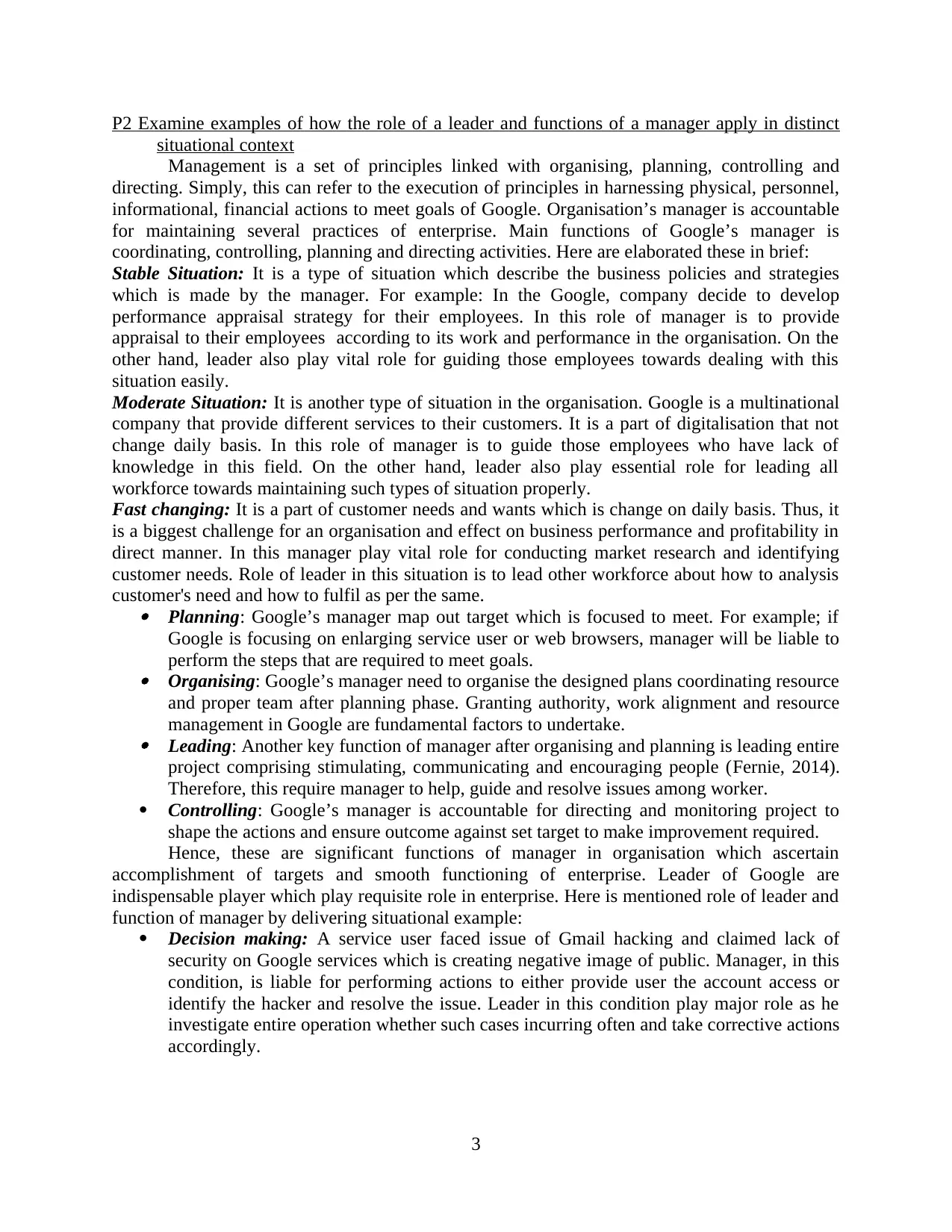
P2 Examine examples of how the role of a leader and functions of a manager apply in distinct
situational context
Management is a set of principles linked with organising, planning, controlling and
directing. Simply, this can refer to the execution of principles in harnessing physical, personnel,
informational, financial actions to meet goals of Google. Organisation’s manager is accountable
for maintaining several practices of enterprise. Main functions of Google’s manager is
coordinating, controlling, planning and directing activities. Here are elaborated these in brief:
Stable Situation: It is a type of situation which describe the business policies and strategies
which is made by the manager. For example: In the Google, company decide to develop
performance appraisal strategy for their employees. In this role of manager is to provide
appraisal to their employees according to its work and performance in the organisation. On the
other hand, leader also play vital role for guiding those employees towards dealing with this
situation easily.
Moderate Situation: It is another type of situation in the organisation. Google is a multinational
company that provide different services to their customers. It is a part of digitalisation that not
change daily basis. In this role of manager is to guide those employees who have lack of
knowledge in this field. On the other hand, leader also play essential role for leading all
workforce towards maintaining such types of situation properly.
Fast changing: It is a part of customer needs and wants which is change on daily basis. Thus, it
is a biggest challenge for an organisation and effect on business performance and profitability in
direct manner. In this manager play vital role for conducting market research and identifying
customer needs. Role of leader in this situation is to lead other workforce about how to analysis
customer's need and how to fulfil as per the same.
Planning: Google’s manager map out target which is focused to meet. For example; if
Google is focusing on enlarging service user or web browsers, manager will be liable to
perform the steps that are required to meet goals.
Organising: Google’s manager need to organise the designed plans coordinating resource
and proper team after planning phase. Granting authority, work alignment and resource
management in Google are fundamental factors to undertake.
Leading: Another key function of manager after organising and planning is leading entire
project comprising stimulating, communicating and encouraging people (Fernie, 2014).
Therefore, this require manager to help, guide and resolve issues among worker.
Controlling: Google’s manager is accountable for directing and monitoring project to
shape the actions and ensure outcome against set target to make improvement required.
Hence, these are significant functions of manager in organisation which ascertain
accomplishment of targets and smooth functioning of enterprise. Leader of Google are
indispensable player which play requisite role in enterprise. Here is mentioned role of leader and
function of manager by delivering situational example:
Decision making: A service user faced issue of Gmail hacking and claimed lack of
security on Google services which is creating negative image of public. Manager, in this
condition, is liable for performing actions to either provide user the account access or
identify the hacker and resolve the issue. Leader in this condition play major role as he
investigate entire operation whether such cases incurring often and take corrective actions
accordingly.
3
situational context
Management is a set of principles linked with organising, planning, controlling and
directing. Simply, this can refer to the execution of principles in harnessing physical, personnel,
informational, financial actions to meet goals of Google. Organisation’s manager is accountable
for maintaining several practices of enterprise. Main functions of Google’s manager is
coordinating, controlling, planning and directing activities. Here are elaborated these in brief:
Stable Situation: It is a type of situation which describe the business policies and strategies
which is made by the manager. For example: In the Google, company decide to develop
performance appraisal strategy for their employees. In this role of manager is to provide
appraisal to their employees according to its work and performance in the organisation. On the
other hand, leader also play vital role for guiding those employees towards dealing with this
situation easily.
Moderate Situation: It is another type of situation in the organisation. Google is a multinational
company that provide different services to their customers. It is a part of digitalisation that not
change daily basis. In this role of manager is to guide those employees who have lack of
knowledge in this field. On the other hand, leader also play essential role for leading all
workforce towards maintaining such types of situation properly.
Fast changing: It is a part of customer needs and wants which is change on daily basis. Thus, it
is a biggest challenge for an organisation and effect on business performance and profitability in
direct manner. In this manager play vital role for conducting market research and identifying
customer needs. Role of leader in this situation is to lead other workforce about how to analysis
customer's need and how to fulfil as per the same.
Planning: Google’s manager map out target which is focused to meet. For example; if
Google is focusing on enlarging service user or web browsers, manager will be liable to
perform the steps that are required to meet goals.
Organising: Google’s manager need to organise the designed plans coordinating resource
and proper team after planning phase. Granting authority, work alignment and resource
management in Google are fundamental factors to undertake.
Leading: Another key function of manager after organising and planning is leading entire
project comprising stimulating, communicating and encouraging people (Fernie, 2014).
Therefore, this require manager to help, guide and resolve issues among worker.
Controlling: Google’s manager is accountable for directing and monitoring project to
shape the actions and ensure outcome against set target to make improvement required.
Hence, these are significant functions of manager in organisation which ascertain
accomplishment of targets and smooth functioning of enterprise. Leader of Google are
indispensable player which play requisite role in enterprise. Here is mentioned role of leader and
function of manager by delivering situational example:
Decision making: A service user faced issue of Gmail hacking and claimed lack of
security on Google services which is creating negative image of public. Manager, in this
condition, is liable for performing actions to either provide user the account access or
identify the hacker and resolve the issue. Leader in this condition play major role as he
investigate entire operation whether such cases incurring often and take corrective actions
accordingly.
3
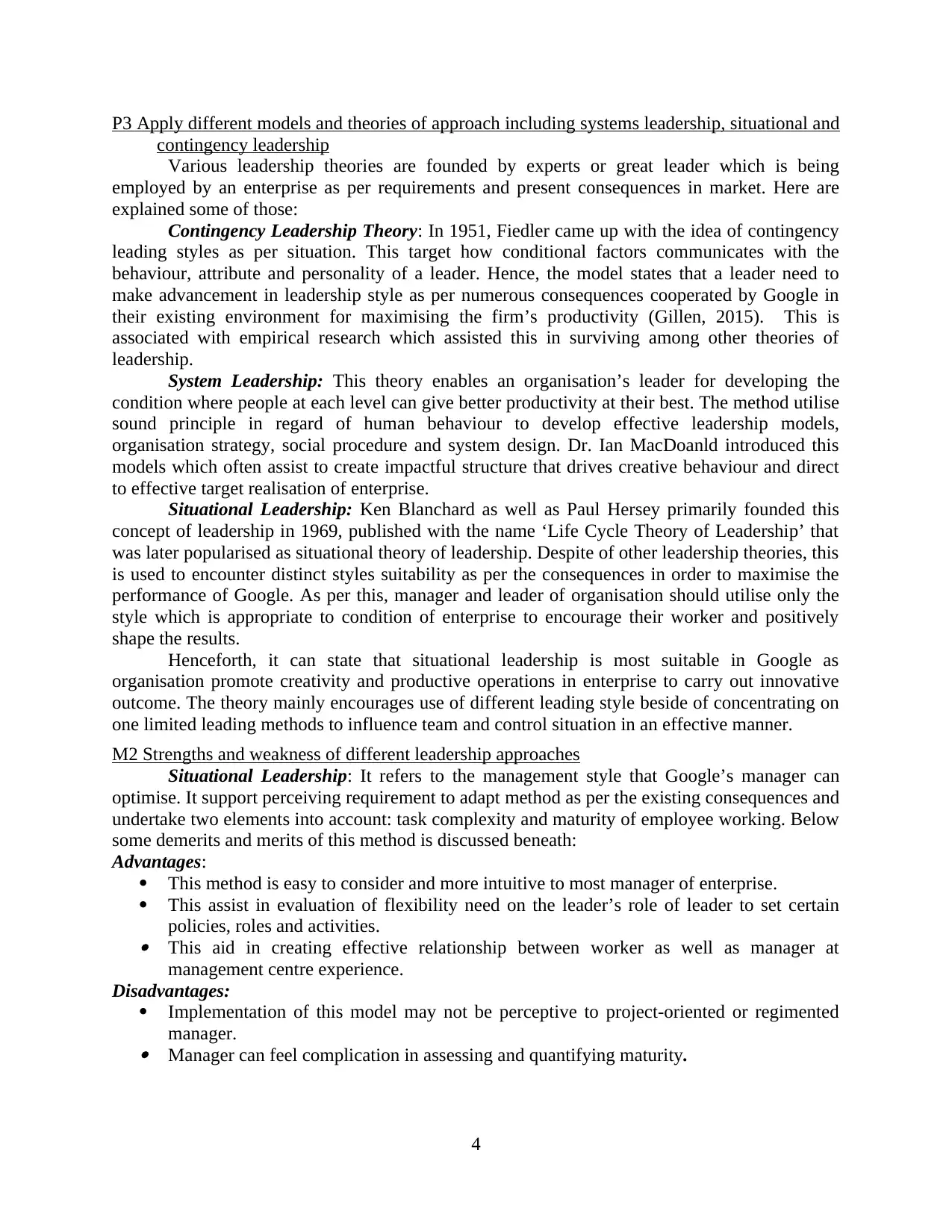
P3 Apply different models and theories of approach including systems leadership, situational and
contingency leadership
Various leadership theories are founded by experts or great leader which is being
employed by an enterprise as per requirements and present consequences in market. Here are
explained some of those:
Contingency Leadership Theory: In 1951, Fiedler came up with the idea of contingency
leading styles as per situation. This target how conditional factors communicates with the
behaviour, attribute and personality of a leader. Hence, the model states that a leader need to
make advancement in leadership style as per numerous consequences cooperated by Google in
their existing environment for maximising the firm’s productivity (Gillen, 2015). This is
associated with empirical research which assisted this in surviving among other theories of
leadership.
System Leadership: This theory enables an organisation’s leader for developing the
condition where people at each level can give better productivity at their best. The method utilise
sound principle in regard of human behaviour to develop effective leadership models,
organisation strategy, social procedure and system design. Dr. Ian MacDoanld introduced this
models which often assist to create impactful structure that drives creative behaviour and direct
to effective target realisation of enterprise.
Situational Leadership: Ken Blanchard as well as Paul Hersey primarily founded this
concept of leadership in 1969, published with the name ‘Life Cycle Theory of Leadership’ that
was later popularised as situational theory of leadership. Despite of other leadership theories, this
is used to encounter distinct styles suitability as per the consequences in order to maximise the
performance of Google. As per this, manager and leader of organisation should utilise only the
style which is appropriate to condition of enterprise to encourage their worker and positively
shape the results.
Henceforth, it can state that situational leadership is most suitable in Google as
organisation promote creativity and productive operations in enterprise to carry out innovative
outcome. The theory mainly encourages use of different leading style beside of concentrating on
one limited leading methods to influence team and control situation in an effective manner.
M2 Strengths and weakness of different leadership approaches
Situational Leadership: It refers to the management style that Google’s manager can
optimise. It support perceiving requirement to adapt method as per the existing consequences and
undertake two elements into account: task complexity and maturity of employee working. Below
some demerits and merits of this method is discussed beneath:
Advantages:
This method is easy to consider and more intuitive to most manager of enterprise.
This assist in evaluation of flexibility need on the leader’s role of leader to set certain
policies, roles and activities.
This aid in creating effective relationship between worker as well as manager at
management centre experience.
Disadvantages:
Implementation of this model may not be perceptive to project-oriented or regimented
manager.
Manager can feel complication in assessing and quantifying maturity.
4
contingency leadership
Various leadership theories are founded by experts or great leader which is being
employed by an enterprise as per requirements and present consequences in market. Here are
explained some of those:
Contingency Leadership Theory: In 1951, Fiedler came up with the idea of contingency
leading styles as per situation. This target how conditional factors communicates with the
behaviour, attribute and personality of a leader. Hence, the model states that a leader need to
make advancement in leadership style as per numerous consequences cooperated by Google in
their existing environment for maximising the firm’s productivity (Gillen, 2015). This is
associated with empirical research which assisted this in surviving among other theories of
leadership.
System Leadership: This theory enables an organisation’s leader for developing the
condition where people at each level can give better productivity at their best. The method utilise
sound principle in regard of human behaviour to develop effective leadership models,
organisation strategy, social procedure and system design. Dr. Ian MacDoanld introduced this
models which often assist to create impactful structure that drives creative behaviour and direct
to effective target realisation of enterprise.
Situational Leadership: Ken Blanchard as well as Paul Hersey primarily founded this
concept of leadership in 1969, published with the name ‘Life Cycle Theory of Leadership’ that
was later popularised as situational theory of leadership. Despite of other leadership theories, this
is used to encounter distinct styles suitability as per the consequences in order to maximise the
performance of Google. As per this, manager and leader of organisation should utilise only the
style which is appropriate to condition of enterprise to encourage their worker and positively
shape the results.
Henceforth, it can state that situational leadership is most suitable in Google as
organisation promote creativity and productive operations in enterprise to carry out innovative
outcome. The theory mainly encourages use of different leading style beside of concentrating on
one limited leading methods to influence team and control situation in an effective manner.
M2 Strengths and weakness of different leadership approaches
Situational Leadership: It refers to the management style that Google’s manager can
optimise. It support perceiving requirement to adapt method as per the existing consequences and
undertake two elements into account: task complexity and maturity of employee working. Below
some demerits and merits of this method is discussed beneath:
Advantages:
This method is easy to consider and more intuitive to most manager of enterprise.
This assist in evaluation of flexibility need on the leader’s role of leader to set certain
policies, roles and activities.
This aid in creating effective relationship between worker as well as manager at
management centre experience.
Disadvantages:
Implementation of this model may not be perceptive to project-oriented or regimented
manager.
Manager can feel complication in assessing and quantifying maturity.
4
⊘ This is a preview!⊘
Do you want full access?
Subscribe today to unlock all pages.

Trusted by 1+ million students worldwide
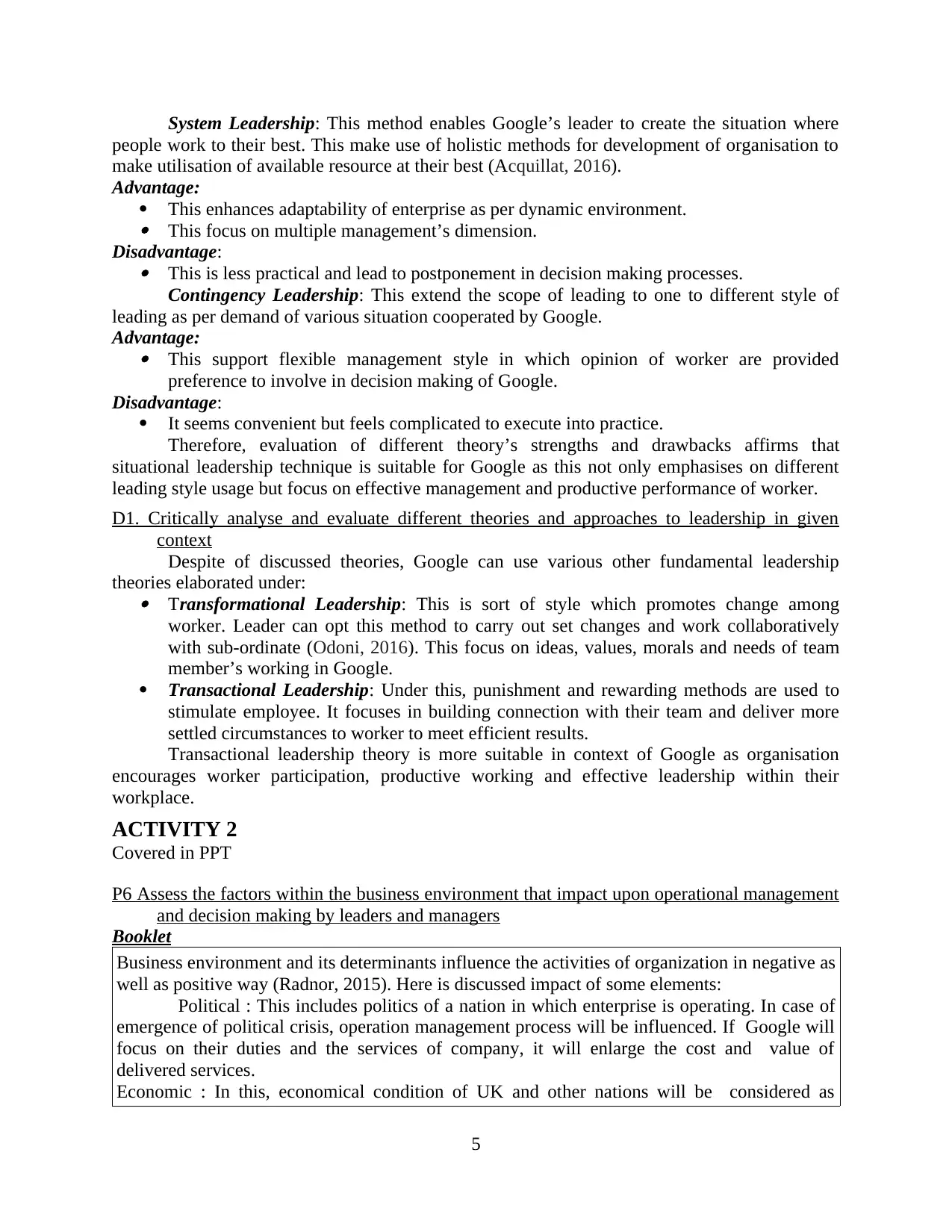
System Leadership: This method enables Google’s leader to create the situation where
people work to their best. This make use of holistic methods for development of organisation to
make utilisation of available resource at their best (Acquillat, 2016).
Advantage:
This enhances adaptability of enterprise as per dynamic environment.
This focus on multiple management’s dimension.
Disadvantage:
This is less practical and lead to postponement in decision making processes.
Contingency Leadership: This extend the scope of leading to one to different style of
leading as per demand of various situation cooperated by Google.
Advantage:
This support flexible management style in which opinion of worker are provided
preference to involve in decision making of Google.
Disadvantage:
It seems convenient but feels complicated to execute into practice.
Therefore, evaluation of different theory’s strengths and drawbacks affirms that
situational leadership technique is suitable for Google as this not only emphasises on different
leading style usage but focus on effective management and productive performance of worker.
D1. Critically analyse and evaluate different theories and approaches to leadership in given
context
Despite of discussed theories, Google can use various other fundamental leadership
theories elaborated under:
Transformational Leadership: This is sort of style which promotes change among
worker. Leader can opt this method to carry out set changes and work collaboratively
with sub-ordinate (Odoni, 2016). This focus on ideas, values, morals and needs of team
member’s working in Google.
Transactional Leadership: Under this, punishment and rewarding methods are used to
stimulate employee. It focuses in building connection with their team and deliver more
settled circumstances to worker to meet efficient results.
Transactional leadership theory is more suitable in context of Google as organisation
encourages worker participation, productive working and effective leadership within their
workplace.
ACTIVITY 2
Covered in PPT
P6 Assess the factors within the business environment that impact upon operational management
and decision making by leaders and managers
Booklet
Business environment and its determinants influence the activities of organization in negative as
well as positive way (Radnor, 2015). Here is discussed impact of some elements:
Political : This includes politics of a nation in which enterprise is operating. In case of
emergence of political crisis, operation management process will be influenced. If Google will
focus on their duties and the services of company, it will enlarge the cost and value of
delivered services.
Economic : In this, economical condition of UK and other nations will be considered as
5
people work to their best. This make use of holistic methods for development of organisation to
make utilisation of available resource at their best (Acquillat, 2016).
Advantage:
This enhances adaptability of enterprise as per dynamic environment.
This focus on multiple management’s dimension.
Disadvantage:
This is less practical and lead to postponement in decision making processes.
Contingency Leadership: This extend the scope of leading to one to different style of
leading as per demand of various situation cooperated by Google.
Advantage:
This support flexible management style in which opinion of worker are provided
preference to involve in decision making of Google.
Disadvantage:
It seems convenient but feels complicated to execute into practice.
Therefore, evaluation of different theory’s strengths and drawbacks affirms that
situational leadership technique is suitable for Google as this not only emphasises on different
leading style usage but focus on effective management and productive performance of worker.
D1. Critically analyse and evaluate different theories and approaches to leadership in given
context
Despite of discussed theories, Google can use various other fundamental leadership
theories elaborated under:
Transformational Leadership: This is sort of style which promotes change among
worker. Leader can opt this method to carry out set changes and work collaboratively
with sub-ordinate (Odoni, 2016). This focus on ideas, values, morals and needs of team
member’s working in Google.
Transactional Leadership: Under this, punishment and rewarding methods are used to
stimulate employee. It focuses in building connection with their team and deliver more
settled circumstances to worker to meet efficient results.
Transactional leadership theory is more suitable in context of Google as organisation
encourages worker participation, productive working and effective leadership within their
workplace.
ACTIVITY 2
Covered in PPT
P6 Assess the factors within the business environment that impact upon operational management
and decision making by leaders and managers
Booklet
Business environment and its determinants influence the activities of organization in negative as
well as positive way (Radnor, 2015). Here is discussed impact of some elements:
Political : This includes politics of a nation in which enterprise is operating. In case of
emergence of political crisis, operation management process will be influenced. If Google will
focus on their duties and the services of company, it will enlarge the cost and value of
delivered services.
Economic : In this, economical condition of UK and other nations will be considered as
5
Paraphrase This Document
Need a fresh take? Get an instant paraphrase of this document with our AI Paraphraser
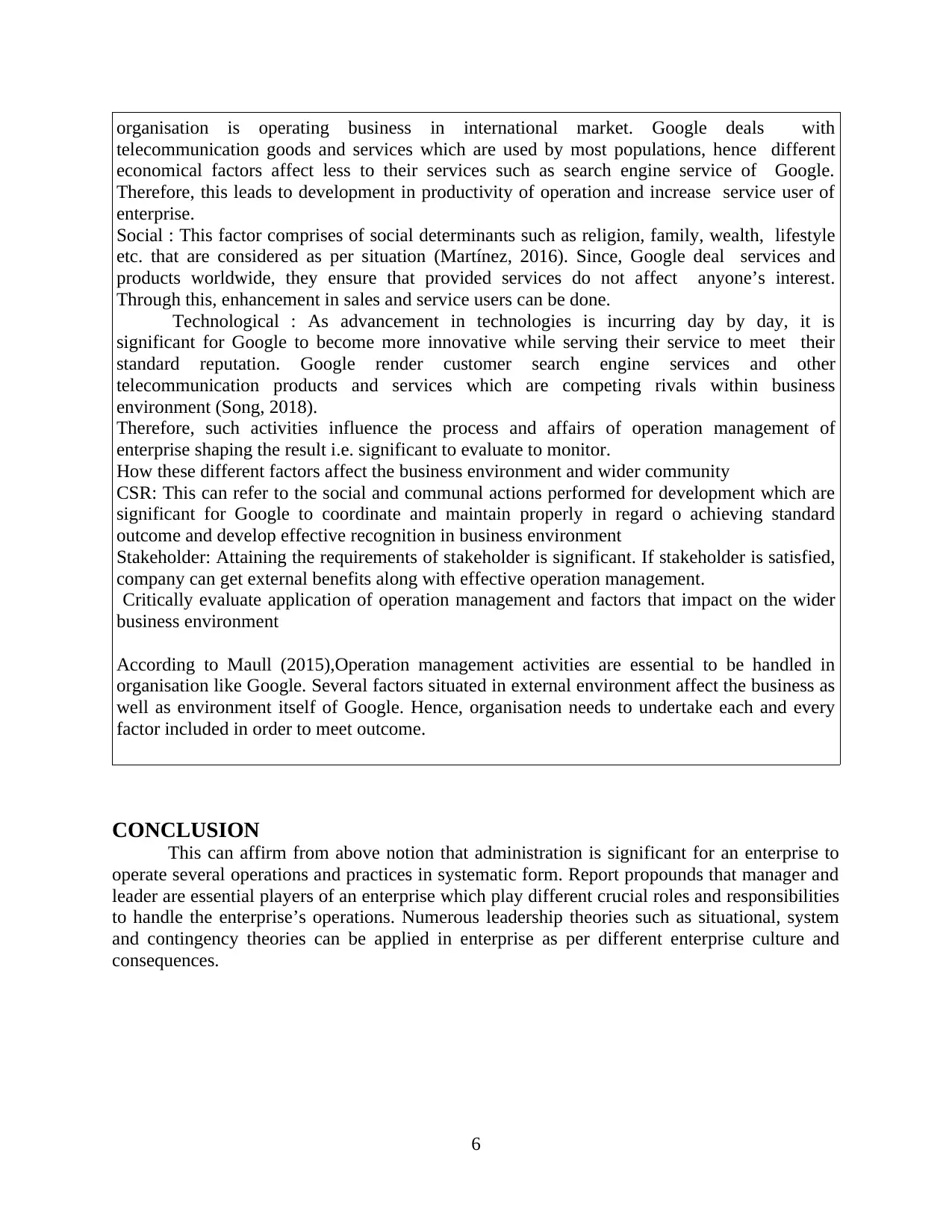
organisation is operating business in international market. Google deals with
telecommunication goods and services which are used by most populations, hence different
economical factors affect less to their services such as search engine service of Google.
Therefore, this leads to development in productivity of operation and increase service user of
enterprise.
Social : This factor comprises of social determinants such as religion, family, wealth, lifestyle
etc. that are considered as per situation (Martínez, 2016). Since, Google deal services and
products worldwide, they ensure that provided services do not affect anyone’s interest.
Through this, enhancement in sales and service users can be done.
Technological : As advancement in technologies is incurring day by day, it is
significant for Google to become more innovative while serving their service to meet their
standard reputation. Google render customer search engine services and other
telecommunication products and services which are competing rivals within business
environment (Song, 2018).
Therefore, such activities influence the process and affairs of operation management of
enterprise shaping the result i.e. significant to evaluate to monitor.
How these different factors affect the business environment and wider community
CSR: This can refer to the social and communal actions performed for development which are
significant for Google to coordinate and maintain properly in regard o achieving standard
outcome and develop effective recognition in business environment
Stakeholder: Attaining the requirements of stakeholder is significant. If stakeholder is satisfied,
company can get external benefits along with effective operation management.
Critically evaluate application of operation management and factors that impact on the wider
business environment
According to Maull (2015),Operation management activities are essential to be handled in
organisation like Google. Several factors situated in external environment affect the business as
well as environment itself of Google. Hence, organisation needs to undertake each and every
factor included in order to meet outcome.
CONCLUSION
This can affirm from above notion that administration is significant for an enterprise to
operate several operations and practices in systematic form. Report propounds that manager and
leader are essential players of an enterprise which play different crucial roles and responsibilities
to handle the enterprise’s operations. Numerous leadership theories such as situational, system
and contingency theories can be applied in enterprise as per different enterprise culture and
consequences.
6
telecommunication goods and services which are used by most populations, hence different
economical factors affect less to their services such as search engine service of Google.
Therefore, this leads to development in productivity of operation and increase service user of
enterprise.
Social : This factor comprises of social determinants such as religion, family, wealth, lifestyle
etc. that are considered as per situation (Martínez, 2016). Since, Google deal services and
products worldwide, they ensure that provided services do not affect anyone’s interest.
Through this, enhancement in sales and service users can be done.
Technological : As advancement in technologies is incurring day by day, it is
significant for Google to become more innovative while serving their service to meet their
standard reputation. Google render customer search engine services and other
telecommunication products and services which are competing rivals within business
environment (Song, 2018).
Therefore, such activities influence the process and affairs of operation management of
enterprise shaping the result i.e. significant to evaluate to monitor.
How these different factors affect the business environment and wider community
CSR: This can refer to the social and communal actions performed for development which are
significant for Google to coordinate and maintain properly in regard o achieving standard
outcome and develop effective recognition in business environment
Stakeholder: Attaining the requirements of stakeholder is significant. If stakeholder is satisfied,
company can get external benefits along with effective operation management.
Critically evaluate application of operation management and factors that impact on the wider
business environment
According to Maull (2015),Operation management activities are essential to be handled in
organisation like Google. Several factors situated in external environment affect the business as
well as environment itself of Google. Hence, organisation needs to undertake each and every
factor included in order to meet outcome.
CONCLUSION
This can affirm from above notion that administration is significant for an enterprise to
operate several operations and practices in systematic form. Report propounds that manager and
leader are essential players of an enterprise which play different crucial roles and responsibilities
to handle the enterprise’s operations. Numerous leadership theories such as situational, system
and contingency theories can be applied in enterprise as per different enterprise culture and
consequences.
6
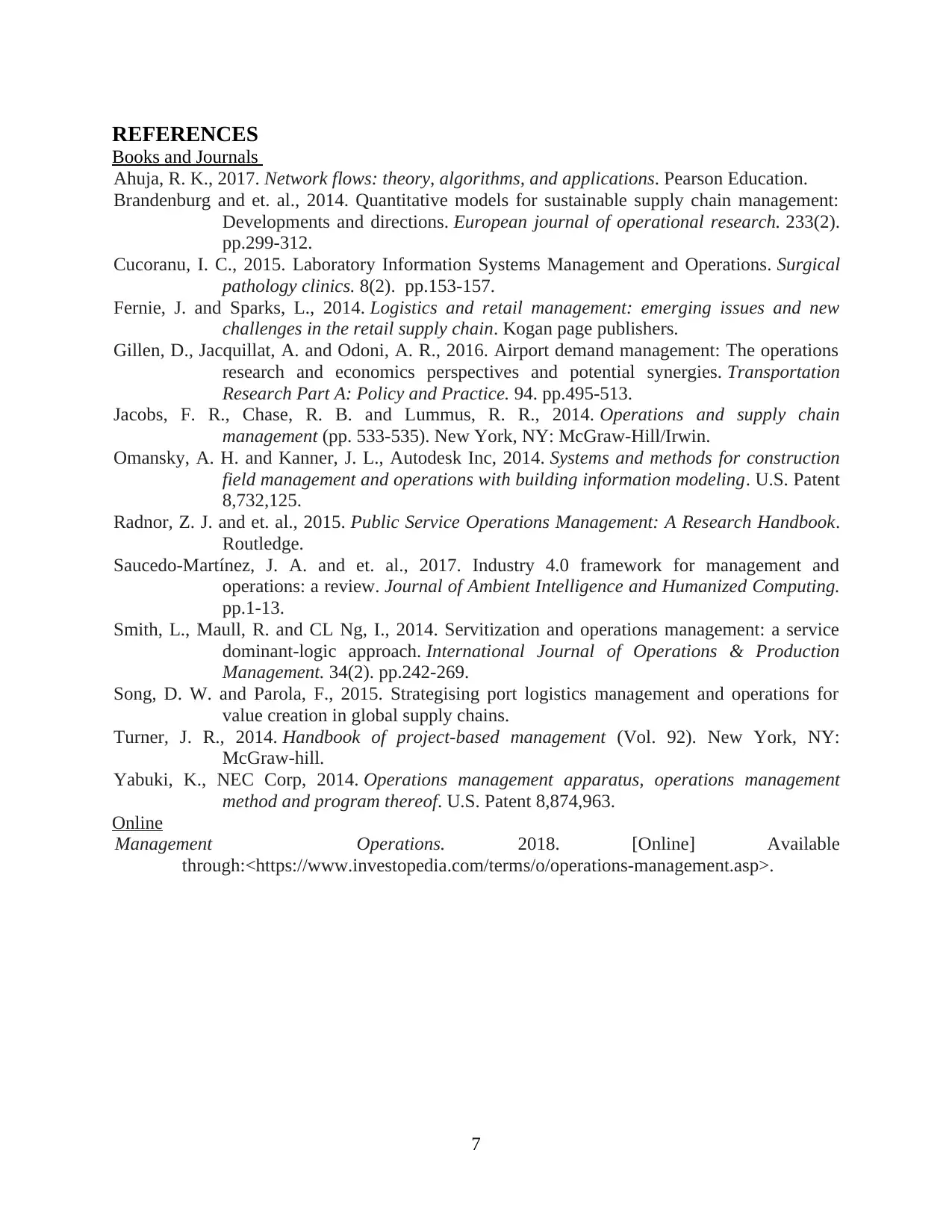
REFERENCES
Books and Journals
Ahuja, R. K., 2017. Network flows: theory, algorithms, and applications. Pearson Education.
Brandenburg and et. al., 2014. Quantitative models for sustainable supply chain management:
Developments and directions. European journal of operational research. 233(2).
pp.299-312.
Cucoranu, I. C., 2015. Laboratory Information Systems Management and Operations. Surgical
pathology clinics. 8(2). pp.153-157.
Fernie, J. and Sparks, L., 2014. Logistics and retail management: emerging issues and new
challenges in the retail supply chain. Kogan page publishers.
Gillen, D., Jacquillat, A. and Odoni, A. R., 2016. Airport demand management: The operations
research and economics perspectives and potential synergies. Transportation
Research Part A: Policy and Practice. 94. pp.495-513.
Jacobs, F. R., Chase, R. B. and Lummus, R. R., 2014. Operations and supply chain
management (pp. 533-535). New York, NY: McGraw-Hill/Irwin.
Omansky, A. H. and Kanner, J. L., Autodesk Inc, 2014. Systems and methods for construction
field management and operations with building information modeling. U.S. Patent
8,732,125.
Radnor, Z. J. and et. al., 2015. Public Service Operations Management: A Research Handbook.
Routledge.
Saucedo-Martínez, J. A. and et. al., 2017. Industry 4.0 framework for management and
operations: a review. Journal of Ambient Intelligence and Humanized Computing.
pp.1-13.
Smith, L., Maull, R. and CL Ng, I., 2014. Servitization and operations management: a service
dominant-logic approach. International Journal of Operations & Production
Management. 34(2). pp.242-269.
Song, D. W. and Parola, F., 2015. Strategising port logistics management and operations for
value creation in global supply chains.
Turner, J. R., 2014. Handbook of project-based management (Vol. 92). New York, NY:
McGraw-hill.
Yabuki, K., NEC Corp, 2014. Operations management apparatus, operations management
method and program thereof. U.S. Patent 8,874,963.
Online
Management Operations. 2018. [Online] Available
through:<https://www.investopedia.com/terms/o/operations-management.asp>.
7
Books and Journals
Ahuja, R. K., 2017. Network flows: theory, algorithms, and applications. Pearson Education.
Brandenburg and et. al., 2014. Quantitative models for sustainable supply chain management:
Developments and directions. European journal of operational research. 233(2).
pp.299-312.
Cucoranu, I. C., 2015. Laboratory Information Systems Management and Operations. Surgical
pathology clinics. 8(2). pp.153-157.
Fernie, J. and Sparks, L., 2014. Logistics and retail management: emerging issues and new
challenges in the retail supply chain. Kogan page publishers.
Gillen, D., Jacquillat, A. and Odoni, A. R., 2016. Airport demand management: The operations
research and economics perspectives and potential synergies. Transportation
Research Part A: Policy and Practice. 94. pp.495-513.
Jacobs, F. R., Chase, R. B. and Lummus, R. R., 2014. Operations and supply chain
management (pp. 533-535). New York, NY: McGraw-Hill/Irwin.
Omansky, A. H. and Kanner, J. L., Autodesk Inc, 2014. Systems and methods for construction
field management and operations with building information modeling. U.S. Patent
8,732,125.
Radnor, Z. J. and et. al., 2015. Public Service Operations Management: A Research Handbook.
Routledge.
Saucedo-Martínez, J. A. and et. al., 2017. Industry 4.0 framework for management and
operations: a review. Journal of Ambient Intelligence and Humanized Computing.
pp.1-13.
Smith, L., Maull, R. and CL Ng, I., 2014. Servitization and operations management: a service
dominant-logic approach. International Journal of Operations & Production
Management. 34(2). pp.242-269.
Song, D. W. and Parola, F., 2015. Strategising port logistics management and operations for
value creation in global supply chains.
Turner, J. R., 2014. Handbook of project-based management (Vol. 92). New York, NY:
McGraw-hill.
Yabuki, K., NEC Corp, 2014. Operations management apparatus, operations management
method and program thereof. U.S. Patent 8,874,963.
Online
Management Operations. 2018. [Online] Available
through:<https://www.investopedia.com/terms/o/operations-management.asp>.
7
⊘ This is a preview!⊘
Do you want full access?
Subscribe today to unlock all pages.

Trusted by 1+ million students worldwide
1 out of 9
Related Documents
Your All-in-One AI-Powered Toolkit for Academic Success.
+13062052269
info@desklib.com
Available 24*7 on WhatsApp / Email
![[object Object]](/_next/static/media/star-bottom.7253800d.svg)
Unlock your academic potential
Copyright © 2020–2026 A2Z Services. All Rights Reserved. Developed and managed by ZUCOL.





